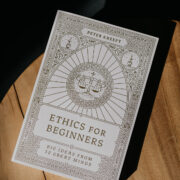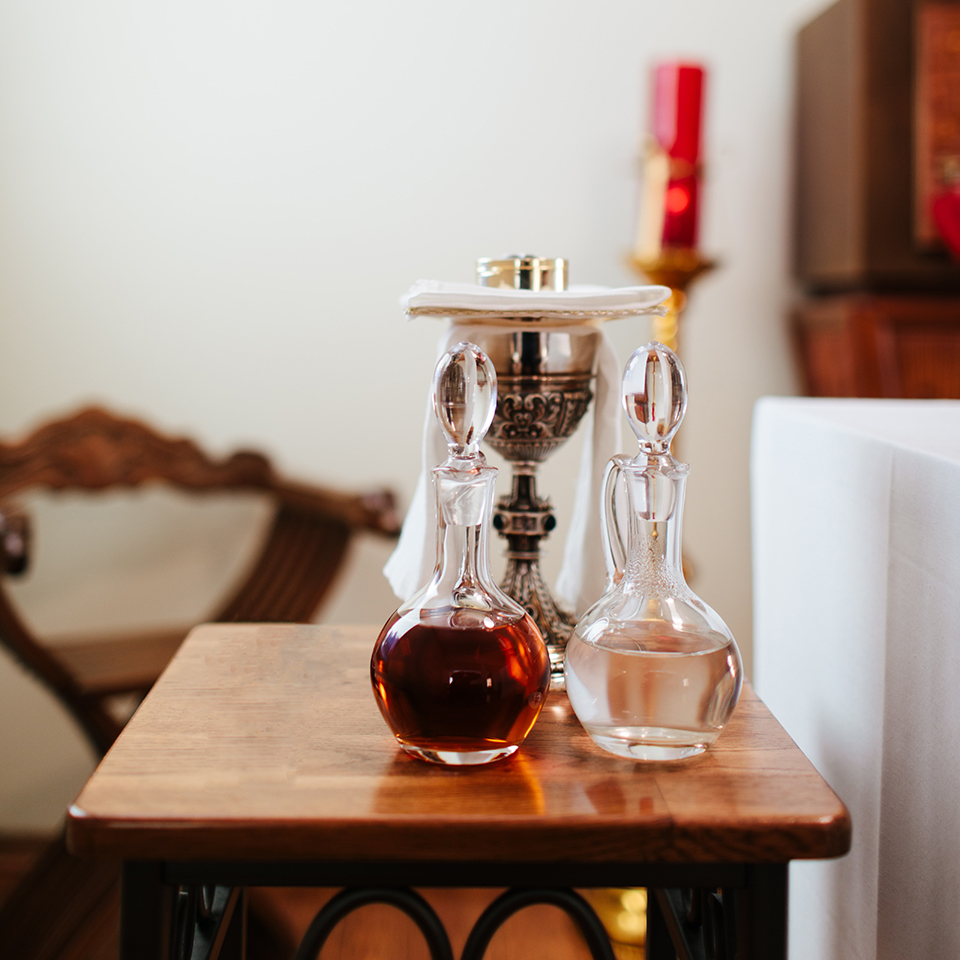When I celebrate Mass as a priest, one of the gestures and accompanying prayer that always strikes me comes as the gifts of bread and wine are being prepared and offered to God the Father. Just after the bread is offered, the wine is then poured into the chalices, followed by the addition by the priest or deacon of a small amount of water as he prays these words: “By the mystery of this water and wine may we come to share in the divinity of Christ who humbled himself to share in our humanity.” As I make this prayer and watch how the water commingles with the wine as it enters the chalice, I am awestruck at how this deeply symbolic action and prayer express the faith of the Church—that by the Eucharist we celebrate and his Body and Blood we receive, we hope to participate in the divinity of him who humbled himself to share in our earthly humanity. This commingling of the water with the wine at Mass is symbolic of the coming together of divinity and humanity in the person of Jesus that was brought about in the mystery of the Incarnation that we celebrate at Christmas.
This symbolic gesture has been part of the Mass from very early on. It is a remnant of an earlier prayer that is to be found in the oldest sacramentary (the Verona Sacramentary) as a Christmas prayer, according to which the birth of Christ is the necessary condition for a marvelous union between divinity and humanity, brought about by the loving initiative of God. Objecting to some gnostic puritans who tried to replace the element of wine at the Eucharist with water, St. Cyprian (c. 200-258) emphasized the symbolic sense of the commingling. For the African Father, just as the wine receives the water in itself, so has Christ taken us and our sins to himself. Therefore, the mixing of the water and the wine symbolizes the intimate union of the faithful with him to whom they have bound themselves in faith; and this union is so firm that nothing can reverse it, just as the water can no longer be separated from the wine.
In Cyprian’s own words: “When someone offers only wine, then the blood of Christ begins to exist without us; but when it is only water, then the people begin to exist without Christ” (Letter 63 to Caecilium). For Cyprian, the key issue here was not the commingling in itself but what it expressed. Together with other Church Fathers, he resisted a false separation between God and humanity that had been overcome by God himself when he assumed our human condition at his conception and birth.
When when we look into the crib, we see a God who has bridged that gap between himself and all humanity out of love for us.
This danger of driving a wedge between the orders of divinity and humanity was to appear again in the course of history. For example, during the Reformation, Martin Luther (1483-1546) declared the commingling part of the Mass as unfitting and removed it. Why? Because he perceived the handiwork of God as belittled, indicative of our oneness with Christ. In response, the Council of Trent explicitly defended the practice in order to defend the unity between humanity and divinity that Jesus accomplished when his divinity was enfleshed in humanity in the womb of Mary and became visible at his birth in Bethlehem (Council of Trent, Session 22, Canon 7).
This is the awesome mystery we contemplate on our knees at the crib at Christmas and every time we participate in the Mass. The controversy over the commingling of the water and wine and the triumph of orthodoxy ensure that when we look into the crib, we see a God who has bridged that gap between himself and all humanity out of love for us. In that Christ child in the manger, we see a God who, because of his birth, has mysteriously united himself to every human being and has drawn our humanity into the very life of the Trinity. So just as the wine receives the water, so the divinity of Christ has received our humanity, yet without confusion of the two natures of divinity and humanity. In the beautiful words of St. Bonaventure (1221-1274): “The Eucharist contains the true Body and immaculate Flesh of Christ, in such a way that it penetrates our being, unites us to one another and transforms us into him through that burning love by which he gave himself to us in the Incarnation.”
What Bonaventure, Cyprian, and other saints were so keen to emphasize is the intimate contact between human nature and the divine love that assumes it and transforms it. So if our humanity is penetrated with divinity, in what way does it shape our lives and make a difference? The fruits of the Holy Spirit come to mind, which should be evident in the life of every Christian: love, joy, peace, patience, kindness, goodness, faithfulness, gentleness, and self-control.

Here is a brief sketch of ways where these fruits of the Spirit show different colors and how the divinity of Christ begins to transform our humanity from the inside out: I begin to think less of my worth from my job, position, talents, reputation, and what others think of me, to thinking more of being a beloved child of God and loved for who I am; I become less afraid of failure and suffering when united to the One who suffered and died on the cross; my human thirst for success shifts to a desire to be faithful to the One to whom I am spiritually united at every moment; rather than my sexual energy as something to be tamed by my own efforts, it becomes directed by the Holy Spirit as a power to love God with my whole being and serve others, willing their good with warmth and affection; when my feelings of resentment or anger are touched by his divinity they change to forgiveness, peace, and healing; as the wine receives the water and divinity receives our humanity, so I begin to see how it’s not about getting God into my world and how I see it, but rather getting into God’s world and how he sees it; when feelings of jealousy are infected by divinity they lead to gratitude and rejoicing for the gifts God has given to everyone; instead of feeling hurt when I am challenged, I see it as an invitation to grow, to mature, and to love more like the divine lover united to me. These are just some of the dynamics of grace that happen when humanity is touched and penetrated by divinity—the mystery that is at the heart of our faith.
At this time of Christmas we contemplate the Christ child and the love of God we see in the crib when God bridged the gap between himself and humanity by the Incarnation of his only begotten Son. Yet during this time of Christmas and long after it has passed, we also ponder the ongoing mystery of the mystical union between our humanity and Christ’s divinity that happened at our Baptism and is sustained and made ever new by our reception of the Eucharist. At that awesome moment when we receive the Lord, the truth of that beautiful prayer earlier in the Mass is fulfilled. For through the mystery of that water and wine, we truly do share in the divinity of Christ who humbled himself to share in our humanity.
This piece was originally published on December 23, 2019, on WordonFire.org.
